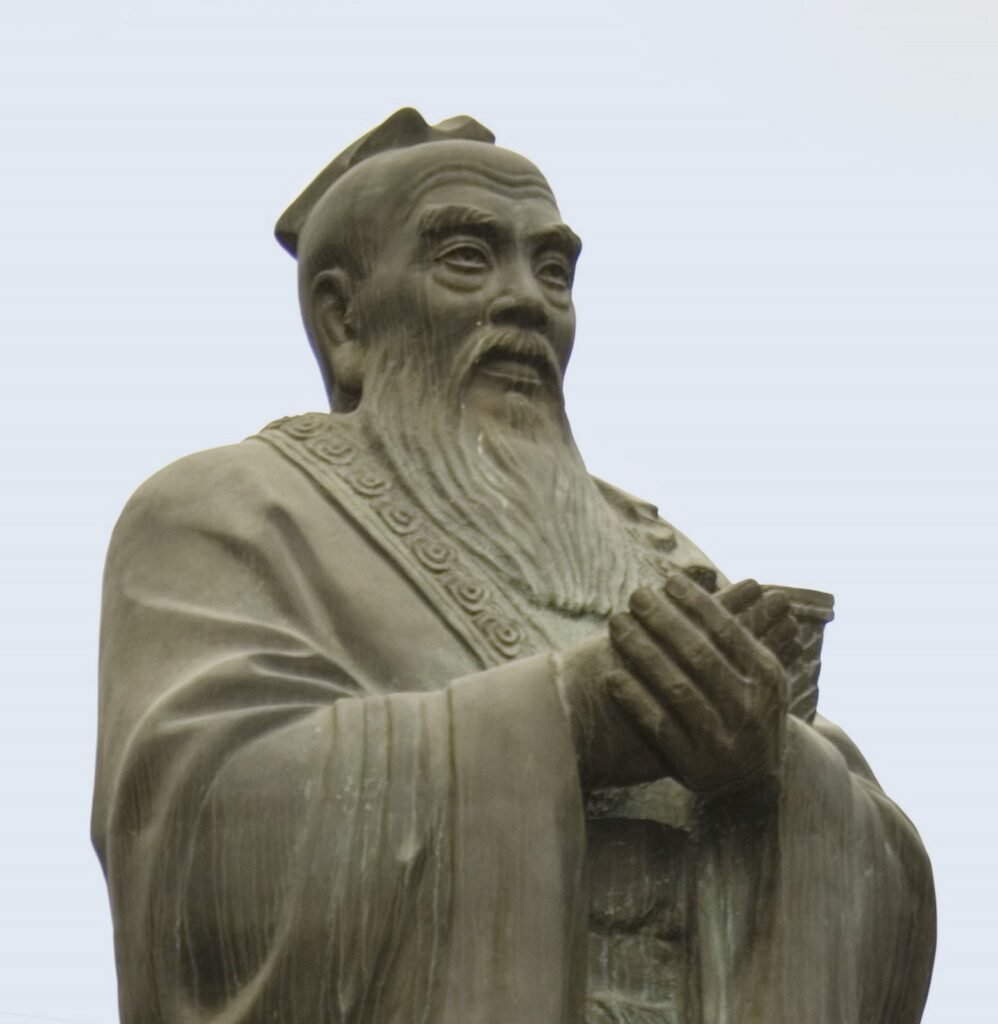Confucius
Confucius, also known as Kong Qiu or Kongzi, was a Chinese philosopher, teacher, and political theorist who lived from 551 BCE to 479 BCE. He is one of the most influential figures in Chinese history, and his teachings have shaped Chinese culture and philosophy for centuries.

Early Life
Confucius was born in the state of Lu, in what is now Shandong province, China. His family was of noble descent but had fallen on hard times. His father died when Confucius was young, and he was raised by his mother in relative poverty. Despite these challenges, Confucius was determined to gain an education and improve his social standing.
Teachings and Philosophy
Confucius’s teachings, known as Confucianism, emphasize personal and governmental morality, the importance of social relationships, justice, and sincerity. Key concepts in Confucianism include:
- Ren (仁): Humaneness or benevolence, the central virtue in Confucianism.
- Li (礼): Proper conduct, rituals, and etiquette.
- Xiao (孝): Filial piety, respect for one’s parents and ancestors.
- Yi (义): Righteousness or moral disposition to do good.
- Zhi (智): Wisdom.
Confucius believed that a harmonious society could be achieved through the cultivation of virtue and moral character. He advocated for the importance of education and self-improvement and believed that rulers should lead by example.
Career and Influence
Confucius held various government positions throughout his life but often faced political opposition. He spent many years traveling through different states, offering his teachings to rulers and gathering disciples. His ideas gained prominence during the Warring States period and were later adopted as the official state philosophy during the Han dynasty.

Legacy
Confucius’s teachings have had a lasting impact on Chinese culture and beyond. His ideas were compiled by his disciples in a collection known as the “Analects” (Lunyu), which remains a key text in Confucianism. Confucianism has influenced various aspects of Chinese society, including education, family structure, and government.

Biography and Early Life
Confucius, born around 551 BCE in the state of Lu (modern-day Shandong province, China), came from a family with noble lineage. Despite the early death of his father and the family’s financial struggles, Confucius was determined to gain knowledge. His early education included learning rituals, music, archery, charioteering, calligraphy, and arithmetic. He married at the age of 19 and had a son and two daughters.
Philosophical Principles
Confucius’s philosophy is deeply rooted in the concepts of:
- Ren (仁): Central to Confucian thought, Ren represents kindness, humaneness, and compassion. It’s the ultimate virtue that governs all actions and relationships.
- Li (礼): This refers to the proper conduct, rituals, and manners that maintain social order and respect within society.
- Xiao (孝): Filial piety emphasizes respect and devotion to one’s parents and ancestors.
- Yi (义): This signifies righteousness and the moral disposition to act rightly and justly.
- Zhi (智): Wisdom is the ability to make informed and morally sound decisions.
- De (德): Virtue or moral integrity that leaders should embody to govern effectively.
Confucianism and Education
Confucius placed a high value on education and self-improvement. He believed that everyone, regardless of social status, had the potential to learn and grow. His teaching methods were interactive, encouraging students to think critically and ask questions.
Political Views
Confucius believed that a ruler should govern by moral example rather than by force or coercion. He advocated for a meritocratic system where officials were chosen based on their abilities and virtues rather than their birthright. His concept of a “gentleman” (junzi) was a person of noble character and integrity, not necessarily of noble birth.
The Five Relationships
Confucius emphasized the importance of harmonious relationships, which he categorized into five key types:
- Ruler and Subject: The ruler should be benevolent, and the subject loyal.
- Father and Son: The father should be loving, and the son respectful.
- Husband and Wife: The husband should be good and fair, and the wife understanding.
- Elder and Younger Sibling: The elder sibling should be gentle, and the younger sibling respectful.
- Friend and Friend: Friends should be considerate and trustworthy to each other.
Confucius’s Travels and Teaching
Confucius traveled extensively during his life, seeking to promote his ideas among the rulers of various states. However, he often met with limited success due to political conflicts and differing ideologies. Despite this, his teachings attracted many loyal disciples who later compiled his sayings and ideas into the “Analects” (Lunyu).
Influence and Legacy
Confucius’s impact on Chinese culture and beyond is profound:
- Government and Politics: His ideas became the foundation for Chinese bureaucracy and the civil service examination system.
- Education: Confucianism emphasized the importance of education and moral development, shaping Chinese educational practices.
- Social Structure: His teachings reinforced the importance of family, hierarchy, and social harmony.
- Philosophy and Ethics: Confucianism influenced various aspects of ethical thinking and continues to be relevant in contemporary discussions on morality and governance.
Confucian Temples and Memorials
After his death in 479 BCE, Confucius was buried in Qufu, his hometown. Over time, many temples were built in his honor, and his birthplace became a site of pilgrimage. Confucian temples often feature statues or portraits of Confucius, along with tablets inscribed with his teachings.


I am really inspired with your writing talents as well as with the layout to your weblog.
Is this a paid topic or did you modify it your self? Either way stay up the nice high quality writing,
it’s uncommon to peer a great blog like this one these
days. Madgicx!
I am really impressed along with your writing talents and also with the structure to your weblog. Is that this a paid theme or did you customize it your self? Either way stay up the excellent high quality writing, it’s uncommon to peer a nice weblog like this one today!